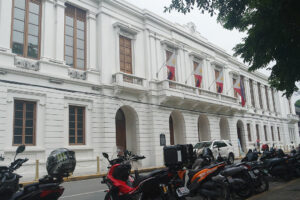THE GOVERNMENT saw mixed results at Monday’s Treasury bill (T-bill) auction, with yields mostly steady as it capped the rise in the 91-day tenor’s rate by making a partial award.
The Bureau of the Treasury (BTr) raised P26.7 billion from the T-bills it auctioned off on Monday, higher than the P25-billion plan as the offer was nearly thrice oversubscribed, with total bids reaching P74.205 billion. However, this was lower than the P98.259 billion in tenders recorded on June 9.
This came even as the BTr made a partial award of the 91-day T-bill as strong demand prompted the Auction Committee to double its acceptance of noncompetitive bids for the 182-day tenor to P6.4 billion, it said in a statement.
Broken down, the Treasury awarded only P6.5 billion in 91-day T-bills on Monday, lower than the P8-billion plan, even as total tenders for the tenor reached P19.425 billion. The three-month paper fetched an average rate of 5.459%, 0.8 basis point (bp) higher than the 5.451% seen in the previous auction, with tenders accepted by the BTr having yields of 5.443% to 5.49%.
Meanwhile, the government raised P11.2 billion from the 182-day securities, well above the P8-billion program, as bids amounted to P29. 67 billion. The average rate of the six-month T-bill was at 5.523%, inching down by 0.1 bp from the 5.524% fetched last week, with accepted rates ranging from 5.505% to 5.543%.
Lastly, the Treasury raised P9 billion as planned via the 364-day debt papers as demand for the tenor totaled P25.11 billion. The average rate of the one-year T-bill edged up by 0.1 bp to 5.657% from 5.656% previously. Accepted bids carried yields of 5.64% to 5.67%.
At the secondary market before Monday’s auction, the 91-, 182-, and 364-day T-bills were quoted at 5.4404%, 5.57%, and 5.6916%, respectively, based on PHP Bloomberg Valuation Service Reference Rates data provided by the Treasury.
The BTr took advantage of the strong demand seen for the 182-day T-bills by hiking its award of the tenor, a trader said in a text message.
“The Treasury bill average auction yields were mostly marginally higher but essentially little changed after the latest Israel-Iran war that led to global crude oil prices reaching new four-month highs,” Rizal Commercial Banking Corp. Chief Economist Michael L. Ricafort said in a Viber message.
Higher oil prices, along with the sharp decline in the peso as the conflict in the Middle East boosted the dollar, could lead to faster inflation here and abroad, which could affect the path of monetary easing, Mr. Ricafort said.
“Markets are also anticipating a possible 25-bp Bangko Sentral ng Pilipinas rate cut in the next rate-setting meeting on June 19,” he said.
“T-bill average auction yields were also mostly marginally higher week on week on lower total bids,” he added.
The BSP is widely expected to deliver a second straight rate cut at its policy meeting on Thursday amid cooling inflation. A BusinessWorld poll conducted last week showed that 15 out of 16 analysts see the Monetary Board bringing down the target reverse repurchase rate by 25 bps to 5.25% from the current 5.5%.
The Monetary Board resumed its easing cycle with a 25-bp rate cut in April following a surprise pause in February due to uncertainties over the impact of the Trump administration’s trade policies on the Philippine economy.
The central bank has reduced borrowing costs by a total of 100 bps since it began its easing cycle in August 2024. BSP Governor Eli M. Remolona, Jr. has said that they may cut rates two more times this year in “baby steps” or increments of 25 bps at a time as the benign inflation outlook gives them ample room to shift to a more accommodative monetary policy stance.
Meanwhile, on Friday, the peso weakened to the P56 level due to the conflict in the Middle East. It closed at another near two-month low of P56.415 on Monday.
The dollar held its ground in choppy trading on Monday, as investors keenly monitored Israel-Iran fighting for any signs that it could escalate into a broader regional conflict and braced for a week packed with central bank meetings, Reuters reported.
As both Iran and Israel showed no signs of backing off from their attacks, market participants mulled the prospect that Tehran might seek to choke off the Strait of Hormuz — the world’s most important gateway for oil shipping — which could raise broader economic risks from disruptions in the energy-rich Middle East.
Crude prices were up about 1% after closing 7% higher on Friday following Israel’s preemptive strike on Iran.
On Monday, the dollar was flat at 144.08 Japanese yen after rising nearly 0.4% earlier in the session, while the euro was muted at $1.1555.
The greenback was also steady against the Swiss franc at 0.811, while an index that measures the dollar against six other currencies dipped 0.1% and was last at 98.11.
On Tuesday, the government will offer P30 billion in reissued 10-year Treasury bonds (T-bonds) with a remaining life of nine years and 10 months.
The Treasury wants to raise P230 billion from the domestic market this month, or P100 billion through T-bills and P130 billion via T-bonds.
The government borrows from local and foreign sources to help fund its budget deficit, which is capped at P1.54 trillion or 5.3% of gross domestic product this year. — A.M.C. Sy with Reuters
